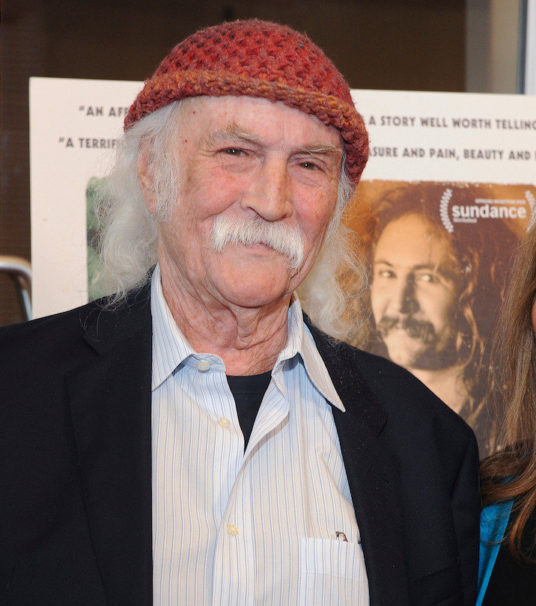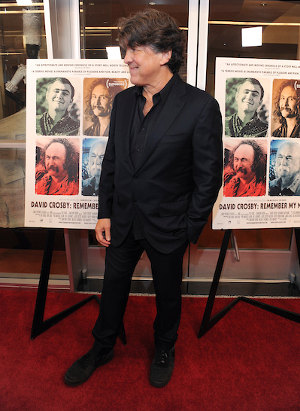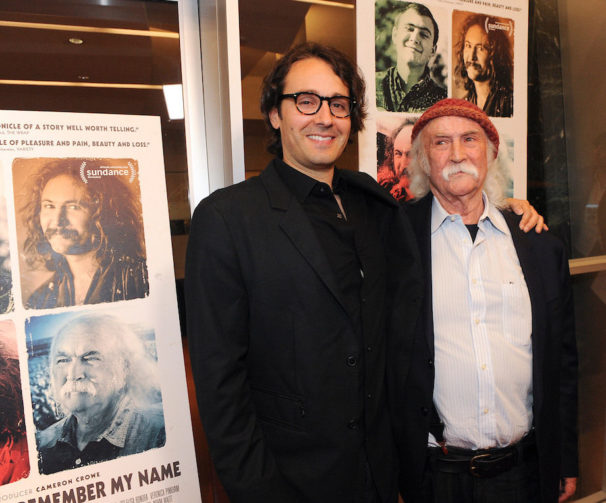
David Crosby, who almost cut his hair but didn’t, ended up having it shorn in a Texas state prison. After serving time for drug possession, he exited the big house as a drab-looking middle-aged, balding man of no particular distinction. Then he grew back his hair. Now he’s the star of his own documentary.
Telling this tale of follicle redemption is David Crosby: Remember My Name, a new Cameron Crowe-produced doc directed by A.J. Eaton. The film received a warm industry reception for the rock-and-roll warrior last night at the Motion Picture Academy’s Mary Pickford Center. Appearing in person with his now snow-white hippie hair tucked into a signature knit cap, Crosby brought in tow the prickly personality that the doc amply demonstrates has been the source of emotional suffering all his life.

“Who do you care about, who do you love, what matters to you, and what are you scared of?” Crosby good-naturedly peppered the audience with these questions. “We wanted to make a documentary that is honest, not another shine job,” he said with characteristic bluntness. Crowe reinforced that sentiment in his remarks, calling Crosby, “utterly honest,” and saying the film is “a movie about what honesty sounds like,” alluding to the daily lying Americans now process in our national political discourse.
The film posits Crosby as a weary but stalwart rock-and-roll Buddha doling out psycho-therapeutic gems from the vantage point of a survivor who’s living at death’s door. His decades of substance abuse brought extreme health issues, just two examples, a transplanted liver, and a eight-stint-supported heart. With minimal prodding by Crowe in interviews, Crosby lays bare an error-riddled life that has left him, he openly admits, bereft of the close relationships for which he has most yearned — most painfully he is estranged from Graham Nash, his closest harmonizer in the band, but also from Stephen Stills, Neil Young, and his Byrds genius-collaborator Roger McGuinn.

The movie is a fun, if overly long, tour of Crosby’s life — careening between playing Woodstock, to fighting with band mates, to mainlining heroin, to, his biggest pleasure, commandeering a sailboat. My personal high point in the film was a montage of massive stadium shows that Crosby, Stills, Nash (and in round two, Young) played. Mind boggling! There is marvelous footage of the Laurel Canyon rock scene that cements Joni Mitchell’s status as the quintessential sixties ‘it’ girl. Discovered by Crosby who brought her to Cali to produce her first album, Mitchell was gorgeous. In a preemptive strike, Crosby covers his #metoo ass — we’ll be hearing more of that from other aging male peacocks of the ’60s — by openly admitting his abusive and withholding nature in a myriad relationships. The film is couched, however, in his loving marriage to Jan Crosby, who journeyed to junkie-ville with her man and back. A charming shot in their northern Cal rock-star abode shows Crosby spooning in bed not with his wife, however, but with his guitar.
The film failed, for me, in making a case for Crosby’s stand-out artistry, but reinforced his role as a crucial anchor cog of a three-legged (and, again, sometimes four-legged) sixties super group. I would have loved more uninterrupted footage of their heavenly harmonizing … and, p.s. I still think “Almost Cut My Hair” is a terrible song! But okay, i love it …
photo credit: amy graves
